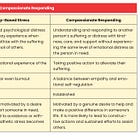What You Really Believe About Leadership Might Be Hurting Your School (and You)
Even when you don’t say it out loud, your habits preach a sermon.
I recently read an article that got under my skin—in a good way.
It was about how employees who unplug—who take real time off, who set boundaries, who resist the pressure to be constantly available—are often penalized by their managers, even when their performance is better than their peers. The research called it the detachment paradox: we say we value rest and balance, but we reward burnout.
As I sat with that, it got me thinking about systems and beliefs—two threads I’ve been weaving together in my upcoming book.
I’m exploring how beliefs are shaped by systems, and how those beliefs often help us adapt. They let us survive dysfunctional environments, protect our self-worth, or maintain order when everything feels chaotic. But left unchecked, those same beliefs can become dangerous. They calcify. They limit growth. They quietly shape a culture no one wants to live in—but everyone feels pressured to maintain.
School leadership is full of these belief-system feedback loops.
The Beliefs You Don’t Say Out Loud—but Still Pass On
In coaching and recruiting school leaders, I’ve noticed that many of the behaviors that burn people out are rooted in quiet, inherited beliefs. They're rarely written down. They live in glances, expectations, and unchecked assumptions.
Let’s make them visible—so we can choose whether to keep them.
Myth #1: Leaders are the first in, last out
Belief: If I’m not visible every second, people won’t think I care.
Reality: You don’t earn credibility through presence—you build it through consistency, clarity, and trust.
What it teaches your team: “To be respected, you must overextend.”
Disruptive reframe: Leadership isn’t about being everywhere. It’s about making the people around you stronger wherever you are.
Myth #2: Rest is earned
Belief: I’ll slow down once this crisis passes. Just after testing. After hiring. After…
Reality: There’s always another fire. The belief that rest is a reward sets up exhaustion as the norm.
What it teaches your team: “Taking care of yourself is selfish unless you’ve suffered first.”
Disruptive reframe: Rest is preparation, not a prize. Leaders who rest lead better.
Myth #3: Real leaders are always reachable
Belief: If I don’t respond right away, people will think I’m dropping the ball.
Reality: Constant availability signals lack of boundaries—not reliability.
What it teaches your team: “If you want to lead, forget about evenings, weekends, or vacation.”
Disruptive reframe: Real leadership means building systems that don’t fall apart without you. Trust is stronger than urgency.
Even when you don’t say it out loud, your habits preach a sermon.
Your team watches what you model.
Do you take a real vacation—or check in every morning?
Do you delegate big responsibilities—or hoard them in the name of “doing it right”?
Do you praise resilience—or only reward sacrifice?
We don't just burn out our best people—we train them to believe burnout is the cost of impact.
So what can you do?
Start with reflection. Ask:
What behaviors am I rewarding?
What unspoken lessons might my team be learning from how I lead?
What belief am I reinforcing when I work through lunch, cancel therapy, or skip my kid’s play?
Then reframe, out loud. Share your mindset shift. Let your team see that boundaries are not barriers—they’re blueprints for sustainable leadership.
What you believe about leadership doesn’t just shape your life. It shapes who chooses to lead next. In other words, these beliefs are killing our leadership pipeline.
If you are working with someone who needs a sustainable mindset shift:
What message does your current schedule send to your team?
When you’re away, do things fall apart? If so, what needs to shift?
What would change if we stopped conflating exhaustion with excellence?











